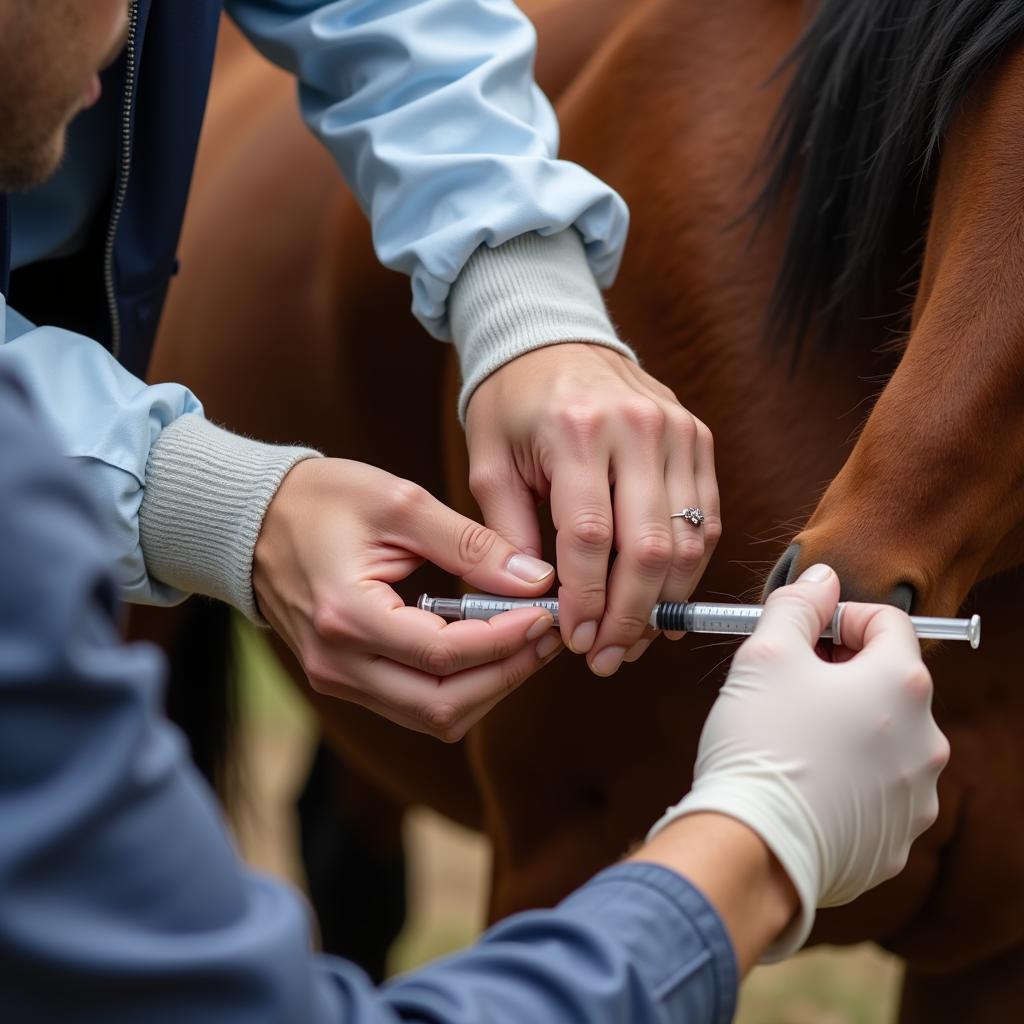Managing pain effectively is crucial for the well-being of your equine companion. Horse Pain Meds play a vital role in alleviating discomfort and promoting healing from injuries or illnesses. From understanding the different types of pain meds available to recognizing signs of pain in horses, this comprehensive guide will equip you with the knowledge to make informed decisions about your horse’s pain management.
Common Types of Horse Pain Meds
Just like humans, horses benefit from a variety of pain relief options. Here are some of the most commonly prescribed horse pain meds:
-
NSAIDs (Non-Steroidal Anti-Inflammatory Drugs): These medications, such as phenylbutazone (“bute”), flunixin meglumine (Banamine), and firocoxib (Equioxx), are highly effective at reducing inflammation and pain. They work by inhibiting the production of prostaglandins, which are chemicals in the body that contribute to pain and inflammation.
-
Corticosteroids: These potent anti-inflammatory drugs, like dexamethasone and prednisolone, are typically reserved for severe cases of inflammation or allergic reactions. While highly effective, they require careful administration due to potential side effects with long-term use.
-
Opioids: In cases of severe pain, opioids like butorphanol (Torbugesic) and morphine may be prescribed. These drugs work by blocking pain signals in the brain and spinal cord. Opioids are typically reserved for short-term use under close veterinary supervision.
-
Other Analgesics: Medications like tramadol and gabapentin may be used to manage chronic pain conditions, often in conjunction with other pain relief strategies.
 Horse receiving pain medication from a veterinarian
Horse receiving pain medication from a veterinarian
Recognizing Pain in Horses: Subtle Signs and Symptoms
Horses are masters at masking pain, making it crucial for owners to be vigilant in observing their behavior. While some signs of pain are obvious, others can be subtle and easily overlooked. Here are some indicators that your horse might be in pain:
-
Changes in Gait: Lameness, stiffness, reluctance to move, or an altered gait are often early signs of pain.
-
Behavioral Changes: Increased irritability, aggression, depression, or lethargy can all be indicators of pain.
-
Changes in Appetite and Water Consumption: A decrease in appetite or water intake can signal discomfort.
-
Increased Heart Rate and Respiration: Pain can cause physiological changes like elevated heart rate and rapid breathing.
-
Sweating: Horses in pain may sweat excessively, even at rest.
-
Pawing or Kicking at the Abdomen: This behavior can indicate abdominal pain or discomfort.
Administering Horse Pain Meds Safely
Proper administration of horse pain meds is paramount to ensure your horse’s safety and well-being. Always consult your veterinarian for a proper diagnosis and treatment plan tailored to your horse’s specific needs.
-
Follow Dosage Instructions Carefully: Never deviate from the prescribed dosage or frequency of medication without consulting your veterinarian.
-
Use the Correct Route of Administration: Horse pain meds come in various forms, including oral pastes, powders, injections, and intravenous fluids. Always administer the medication as directed by your veterinarian.
-
Monitor for Side Effects: While generally safe when used appropriately, horse pain meds can cause side effects like gastrointestinal upset, ulcers, or kidney problems. Contact your veterinarian immediately if you notice any adverse reactions.
FAQs about Horse Pain Meds
Q: How can I tell if my horse needs pain medication?
A: Observing changes in your horse’s behavior, gait, and vital signs can indicate pain. Always consult your veterinarian for a proper diagnosis and treatment plan.
Q: What are the risks of giving my horse pain medication?
A: While generally safe when used as directed, horse pain meds can cause side effects, especially with prolonged use. Discuss potential risks with your veterinarian.
Q: Can I give my horse human pain relievers?
A: Never give your horse human medications without consulting your veterinarian. Many human pain relievers can be toxic or even fatal to horses.
 Veterinarian and horse owner discussing pain management options
Veterinarian and horse owner discussing pain management options
Contact Justus Horses USA for Expert Advice
Managing pain in horses requires a comprehensive approach and expert guidance. If you suspect your horse is experiencing pain or have questions about equine pain management, don’t hesitate to contact Justus Horses USA. Our team of experienced professionals is dedicated to providing exceptional care and support for your equine partners.
Call us at: 0772127271
Email us at: [email protected]
Visit us at: QGM2+WX2, Vị Trung, Vị Thuỷ, Hậu Giang, Vietnam
We’re available 24/7 to assist you with all your horse care needs.